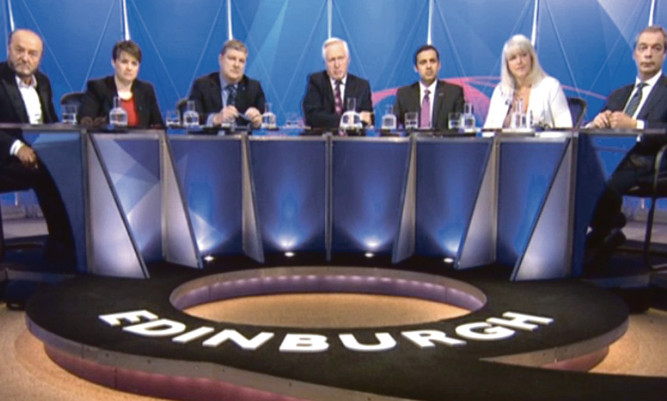
The Question Time panel didn’t remotely reflect Scottish political life.
The question I’ve been asked most this week is: “So did you enjoy your appearance on Question Time?”
Well, I’m not sure “enjoy” would be the right word.
I was one of a lively six- person panel on the BBC’s political debate programme on Thursday night (June 13).
The hour-long show was recorded in Edinburgh’s Corn Exchange venue before a sparky audience of 16 and 17-year-olds who’ll be voting for the first time in British history in next year’s independence referendum.
To get an easy question out of the way no, they don’t tell you what subjects will be aired beforehand (except that, obviously, the subject of independence would come up).
So last week was like revising for exams with an ever-changing, never-ending stream of breaking news stories. It gave me sympathy for students and even politicians.
At the event, behind the scenes it was easy to spot the six panellists. We were the ones who weren’t nibbling the tasty canaps before going on.
Tension was in the air and for good reason. The Scottish Greens had formally objected to the UKIP and Respect leaders being on the panel when neither have Scottish MSPs or councillors, while the Greens and Lib Dems were excluded despite having both.
In an ordinary week that might be excusable. But days before the Aberdeen Donside by-election when the Representation of the People Act requires political balance from broadcasters and a year before we vote on the country’s constitutional future? Hmm.
Now, I know a popular programme like Question Time relies on getting everyone out of their comfort zone and edgy confrontational characters like George and Nigel are good at doing that. But the massive McDifficulty that faces the Beeb for the next 500 days was laid bare on Thursday night. The truth is that Scottish and English political realities are profoundly different. And at least two different audiences watch Question Time.
One is the large English audience, which voted Tory at the last General Election 25% of them backed UKIP in the last local elections and half would leave the EU if they could. The second audience is Scots who voted SNP at the last
Holyrood election and Labour at the last General Election.
Just 0.28% of them backed UKIP in local elections and 53% would stay in the EU. One audience has an independence referendum to get its head round in 500 days flat. The other doesn’t.
But Question Time broadcasts across the whole of the UK and selects content, contributors and questions to keep that predominantly English audience watching. That’s a numerical reality. If that majority audience feels excluded or bored, it switches off.
That’s why the Question Time panel didn’t remotely reflect Scottish political life, even at this sensitive moment for democracy and balance.
But what of it? George Galloway in full flight is eminently watchable and the energy needed to interrupt him probably brings out the best (and worst) in fellow panelists and indeed himself. But is it fair to give more airtime to non-local, “shock jock” panelists than the Scots who help run Scotland and have chosen to stay and live here?
Thursday’s appearance made Farage the most regular contributor to Question Time since 2009. Why?
The BBC is about to appoint a head of referendum coverage perhaps they can ask without getting their lugs skelped.

Enjoy the convenience of having The Sunday Post delivered as a digital ePaper straight to your smartphone, tablet or computer.
Subscribe for only £5.49 a month and enjoy all the benefits of the printed paper as a digital replica.
Subscribe